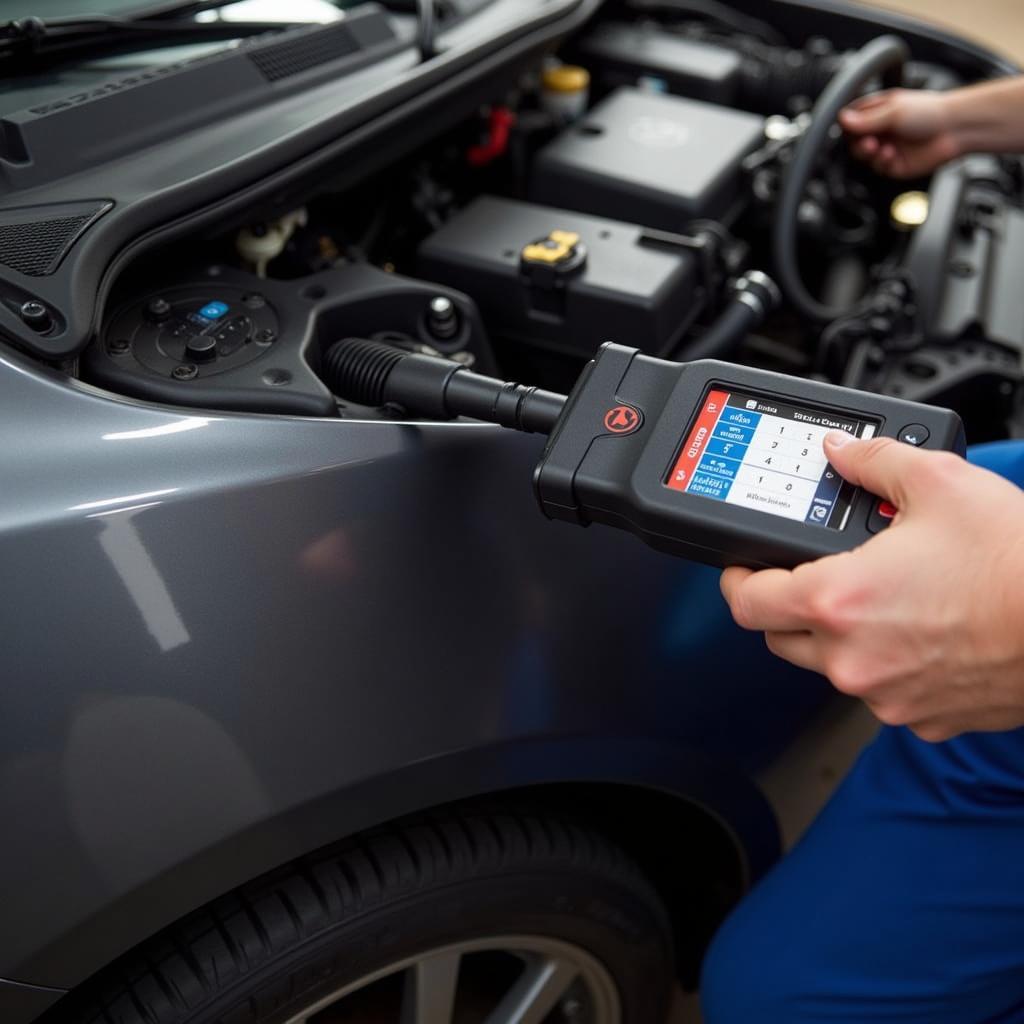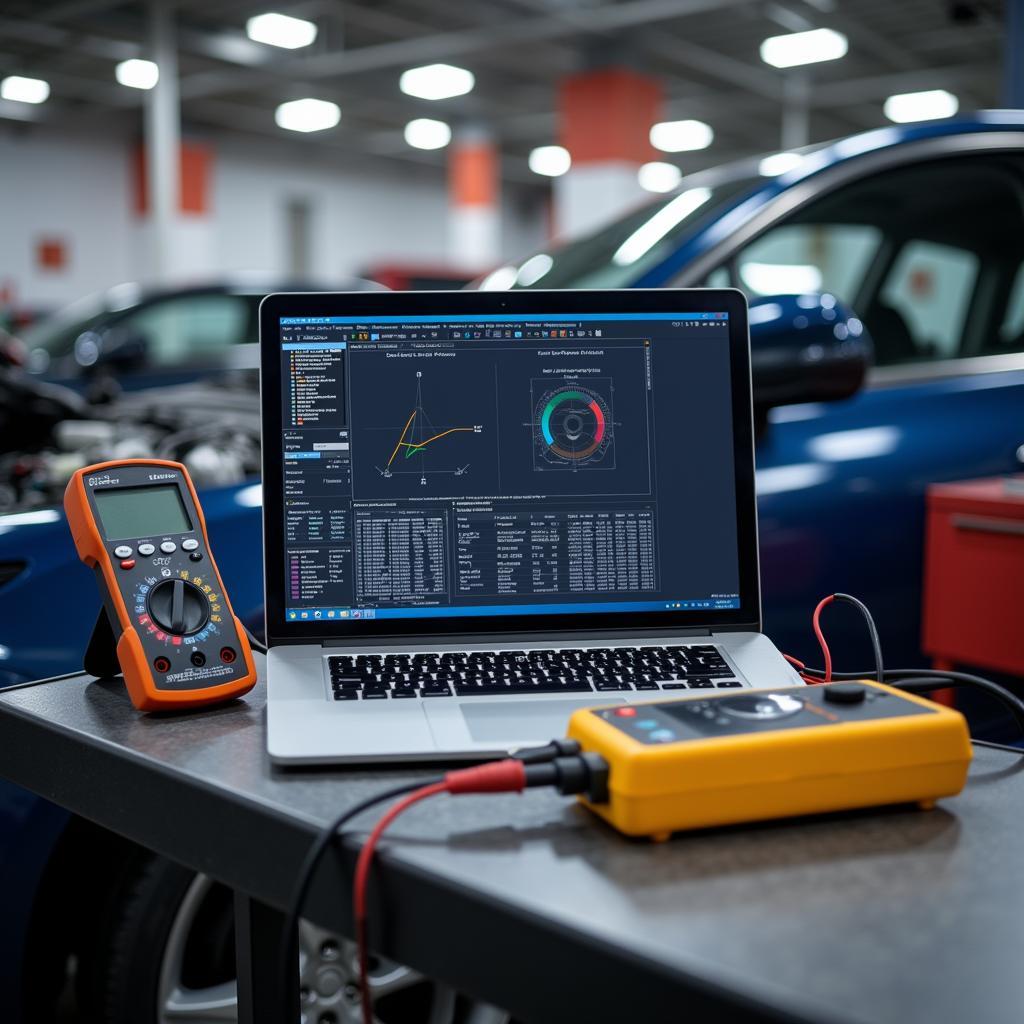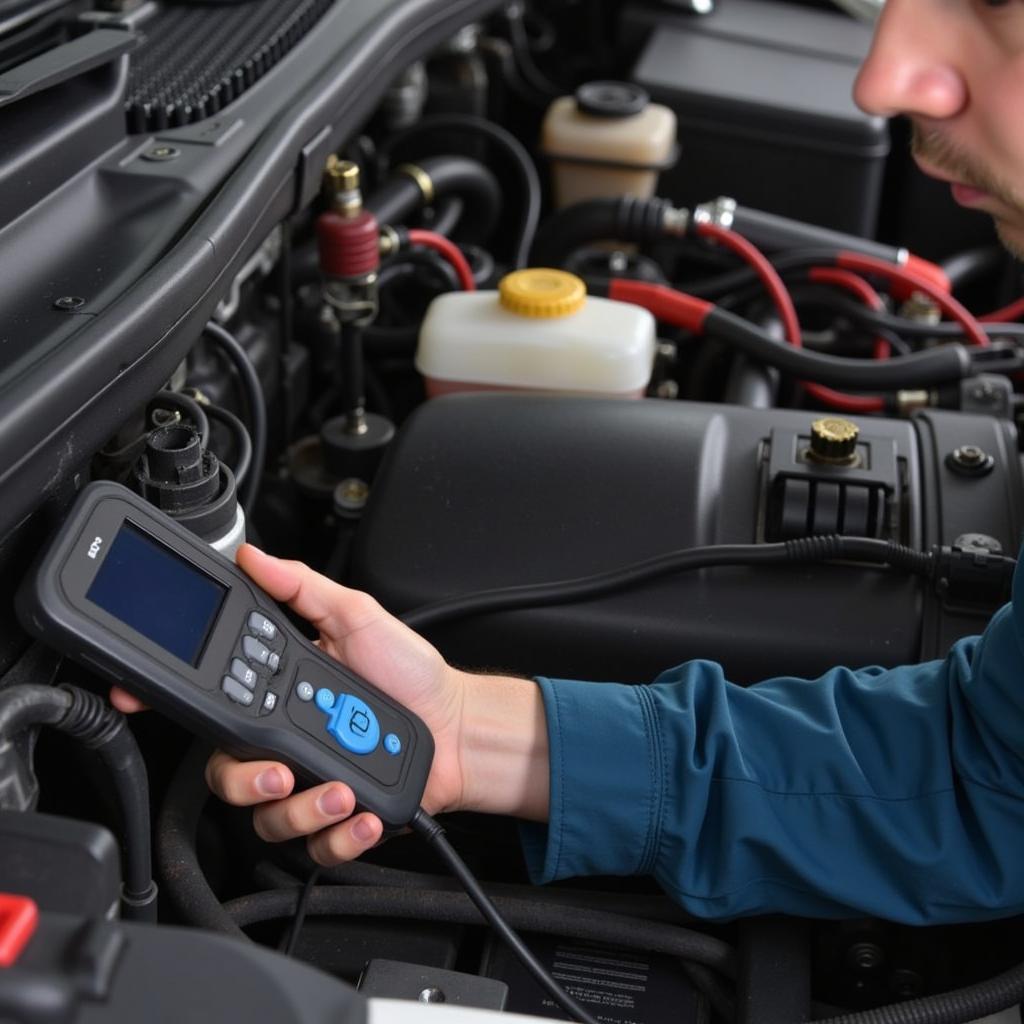Modern vehicles are technological marvels, relying heavily on intricate computer systems to manage everything from engine performance to safety features. When a problem arises, Car Computer Diagnostics come into play. This sophisticated technology allows mechanics to pinpoint the root cause of an issue by communicating with your car’s onboard computer.
 Car Computer Diagnostics Process
Car Computer Diagnostics Process
What is Car Computer Diagnostics?
Car computer diagnostics involve retrieving data from your vehicle’s Engine Control Unit (ECU), often referred to as the car’s brain. This data, collected through a standardized port (usually the OBD-II port), provides valuable insights into the health and performance of your car’s various systems.
How Does Car Computer Diagnostics Work?
The process typically involves connecting a specialized scan tool to your car’s OBD-II port. This tool acts as a bridge, allowing mechanics to read and interpret the diagnostic trouble codes (DTCs) stored in your car’s ECU. These codes act like digital breadcrumbs, pointing towards potential areas of concern within your car’s systems.
Why is Car Computer Diagnostics Important?
Gone are the days of relying solely on mechanical expertise to diagnose car problems. Car computer diagnostics offers several key advantages:
- Accurate Diagnosis: By accessing the ECU’s data, mechanics can identify the root cause of problems with greater accuracy, reducing guesswork and unnecessary repairs.
- Early Detection: Diagnostic tools can detect minor issues before they escalate into major problems, saving you from costly repairs down the line.
- Improved Efficiency: With a precise diagnosis in hand, mechanics can work more efficiently, reducing the time your car spends in the shop.
 Advanced Car Diagnostic Equipment
Advanced Car Diagnostic Equipment
What Can Car Computer Diagnostics Detect?
Car computer diagnostics can uncover a wide range of issues across different vehicle systems, including:
- Engine Problems: Misfires, fuel system issues, emission control problems.
- Transmission Issues: Slipping gears, rough shifting, solenoid problems.
- Brake System Faults: ABS problems, brake fluid level sensors, electronic parking brake issues.
- Airbag System Malfunctions: Deployment issues, sensor faults.
- Electrical System Problems: Battery issues, alternator charging problems, wiring faults.
Understanding Diagnostic Trouble Codes (DTCs)
When your car’s ECU detects a problem, it generates a DTC, a five-digit alphanumeric code that corresponds to a specific issue. While understanding these codes requires some technical knowledge, you can find resources online that provide detailed explanations of common DTCs.
DIY vs. Professional Car Computer Diagnostics
While affordable OBD-II scanners are available for car owners, keep in mind that interpreting the data and diagnosing the problem accurately often requires the expertise of a trained mechanic. They have access to advanced tools, technical knowledge, and experience to interpret the data effectively and recommend the appropriate course of action.
 Mechanic Performing Car Computer Diagnostics
Mechanic Performing Car Computer Diagnostics
Car Computer Diagnostics: Essential for Modern Car Maintenance
Car computer diagnostics has revolutionized car maintenance and repair. By providing deep insights into your vehicle’s health, this technology enables faster, more accurate diagnoses, leading to more effective repairs and a longer lifespan for your car. While basic OBD-II scanners empower car owners to some extent, seeking professional assistance for comprehensive diagnostics and repairs ensures your car receives the best possible care.
If you’re experiencing issues with your vehicle or want to ensure its optimal performance, consider seeking professional car computer diagnostics services dublin for accurate diagnosis and effective solutions. For those interested in the cost aspect, you can find detailed information on car computer diagnostics prices on our website. If you’re looking for advanced car computer diagnostics solutions, explore our comprehensive al car computer diagnostics services. For more information on specific car computer diagnostic tools and services, check out our dedicated page on car computer diagnostic. To understand the basics of car diagnostics and how tests are conducted, read more about the autozone car diagnostic test.
FAQs About Car Computer Diagnostics
1. How often should I get my car’s computer diagnosed?
It’s generally recommended to have your car’s computer diagnosed at least once a year or as part of your regular maintenance schedule.
2. Will a car computer diagnostic drain my car’s battery?
No, modern diagnostic tools use minimal power and shouldn’t drain your car’s battery.
3. Can I drive my car with a diagnostic trouble code (DTC)?
While you might be able to drive for a short distance with a DTC, it’s crucial to have the issue diagnosed and addressed as soon as possible to prevent further damage.
4. Can I reset or clear DTCs myself?
Yes, you can reset DTCs using an OBD-II scanner. However, this is not a permanent fix, and the code will reappear if the underlying problem isn’t addressed.
5. Are car computer diagnostics covered under warranty?
Warranty coverage for car computer diagnostics varies depending on your car’s manufacturer and warranty terms. Consult your warranty documentation or contact your dealer for specific information.
Need assistance with your car’s diagnostics? Our team of experts is here to help! Contact us via WhatsApp: +1(641)206-8880, or email us at [email protected]. We provide 24/7 customer support to answer all your car diagnostic queries.

Leave a Reply